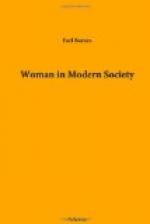During the summer of 1911, I spent a month in the State of Idaho; and as I had long been interested in the problem of equal suffrage, both in England and America, I seized eagerly on the opportunity to study its practical workings at first hand. On the streets and in the tram-cars, in hotel lobbies and in lecture halls, when dining out or when making a call, few people escaped inquisition. I interviewed working men and women, men of affairs, ranchers, sheep raisers and miners, doctors, lawyers, teachers, ministers and practical politicians, both men and women.
The thing that first impresses one who has been intimately in touch with the excited and turbulent condition of mind among the English suffragettes, and the sustained and often impassioned feeling of Eastern suffrage leaders, is the absence of any burning interest in the subject on the part of men or women in Idaho. In London or New York, a suffrage inquirer would constantly strike “live wires;” in Idaho, every one is insulated. The subject is no more an issue than civil service reform or state versus national control of banking systems. Most people have even forgotten the passage of the constitutional amendment conferring equal suffrage, in 1896. Since then, men and women have gone on voting and holding office until the woman’s right has become as commonplace as, and no more interesting or questionable than, the vote of any busy citizen in New Jersey.
The first question that one raises, is naturally whether women do actually vote and hold office in Idaho. To answer this question, there is no body of statistics available. Every one, however, declares that they pretty generally vote. On account of long distances in the country side, they poll less votes than men, especially if the weather is bad. Probably about three-quarters as many women as men go to the polls. Often I met women who said that they did not care for the vote, and sometimes one who said she thought women ought not to vote; but these same women often added that since they had the responsibility they felt it their duty to cast a ballot; and no woman told me that she did not fulfil the obligation.
In the first legislature which met after the granting of equal suffrage, that of 1898, three women were seated, Mrs. Hattie F. Noble, Clara L. Cambell, and Mary A. Wright; Mrs. Wright afterward became chief clerk of the House. In 1908, another woman, Mrs. Lottie J. McFadden, was returned; but there was no woman in the last legislature, and so far as I can learn, only these four have taken part in law-making. When asked why, after the first ardor of emancipation, women have taken so little part in legislation, most people said it was because they had found the work and conditions surrounding it unsuited to them. It seems generally agreed, however, that a woman could be elected to the legislature at any time if she represented a cause which needed to be brought before the people through that body.




